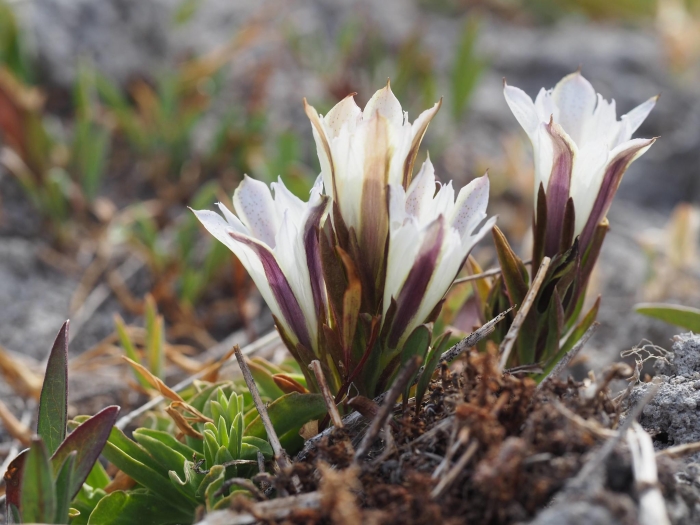Alpine Gentian
(Gentiana newberryi)
Alpine Gentian (Gentiana newberryi)
/
/

Nina House
CC BY 4.0
Image By:
Nina House
Recorded By:
Copyright:
CC BY 4.0
Copyright Notice:
Photo by: Nina House | License Type: CC BY 4.0 | License URL: http://creativecommons.org/licenses/by/4.0/ | Rights Holder: Nina House | Publisher: iNaturalist | Date Created: 2021-07-24T16:58:41-07:00 |

























Estimated Native Range
Summary
Gentiana newberryi, commonly known as Alpine Gentian, is a perennial herb that thrives in subalpine and alpine wet meadows, as well as along streambanks and in moist mountainous areas of the western United States. It is particularly native to California and Oregon. Alpine Gentian typically forms low mats with stems lying against the ground, reaching only a few inches in height. The lance-shaped leaves are arranged oppositely along the stems. From late summer to early fall, it produces distinctive trumpet-shaped flowers that are primarily white but are strikingly striped with blue, which can be quite showy when in bloom. The fruit is a capsule that releases numerous small, winged seeds when mature.
Alpine Gentian is valued for its unique and attractive flowers, which can add a splash of color to rock gardens, alpine collections, and native plant gardens. It is relatively easy to maintain, provided it is grown in conditions that mimic its natural habitat. This plant requires consistently moist soil, good drainage, and prefers full to partial sun exposure. While it is not commonly found in cultivation, it can be a rewarding plant for those interested in native and alpine flora. In terms of potential problems, Alpine Gentian is generally disease-resistant but can suffer from root rot if the soil is not well-drained. It is not known to be invasive when grown outside its native range, but care should be taken to avoid overly wet conditions that could lead to root issues.CC BY-SA 4.0
Alpine Gentian is valued for its unique and attractive flowers, which can add a splash of color to rock gardens, alpine collections, and native plant gardens. It is relatively easy to maintain, provided it is grown in conditions that mimic its natural habitat. This plant requires consistently moist soil, good drainage, and prefers full to partial sun exposure. While it is not commonly found in cultivation, it can be a rewarding plant for those interested in native and alpine flora. In terms of potential problems, Alpine Gentian is generally disease-resistant but can suffer from root rot if the soil is not well-drained. It is not known to be invasive when grown outside its native range, but care should be taken to avoid overly wet conditions that could lead to root issues.CC BY-SA 4.0
Plant Description
- Plant Type: Herb
- Height: 0.5-1.5 feet
- Width: 0.5-1.5 feet
- Growth Rate: Moderate
- Flower Color: Blue, White
- Flowering Season: Summer, Fall
- Leaf Retention: Deciduous
Growth Requirements
- Sun: Full Sun, Part Shade
- Water: High
- Drainage: Medium, Slow
Common Uses
Border Plant, Butterfly Garden, Low Maintenance, Water Garden
Natural Habitat
Subalpine and alpine wet meadows, streambanks, and moist mountainous areas
Other Names
Common Names: Newberry’s gentian
Scientific Names: , Gentiana newberryi, Gentiana newberryi var. newberryi,
GBIF Accepted Name: